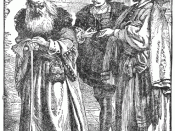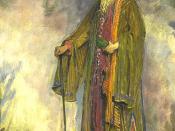Godly Hypocrisy:
Renaissance Christians in Actions and Words
As Illustrated by the Plays of Wm. Shakespeare
"If a Jew wrong a Christian, what is his humility? Revenge! If a Christian wrong a Jew, what should his sufferance be by Christian example? Why revenge! The villainy you teach me I will execute..."
During the Renaissance, men were willing to fight and die for their religion. Wars were waged to defeat the "pagan empires" of the East, while the heathen within--the Jew--was relegated to second-class citizenship. All non-Christian faiths were consigned to the category of "godless", and a great deal of blood was shed over the conversion of these 'lost souls'. Christianity was the one true faith, and it was the special mission of the holy European male to spread salvation to the world--even if it meant hatred and death.
As Shylock suggests in the above quotation, Renaissance Christians preached peace, disdaining the "warlike and vengeful" Turks--while they, themselves, were deeply imeshed in the cycle of bloody revenge.
Many other hypocrisies are plainly evident, in a simple observation of "Christian doctrine" and the actions undertaken in the name of it. During this time period, of which vestiges remain even today, the Jew was seen as a greedy, two-faced subhuman. Not only did English Jews refuse to believe in Christ as Savior, but they had, in fact, been responsible for His death--thus condemning themselves to lives of eternal persecution. In his article "Shylock and the 'Conditioned Imagination'", Michael Echeruo notes that
"The Jew was thus identified as a reject, as an inveterate hater of Christ and Christians.
In medieval drama, the Jew is shown consistently in this role. Though the New Testament made it clear that Christ was scourged and tormented by Roman soldiers, the Play of Corpus Christi (1415) has four...


